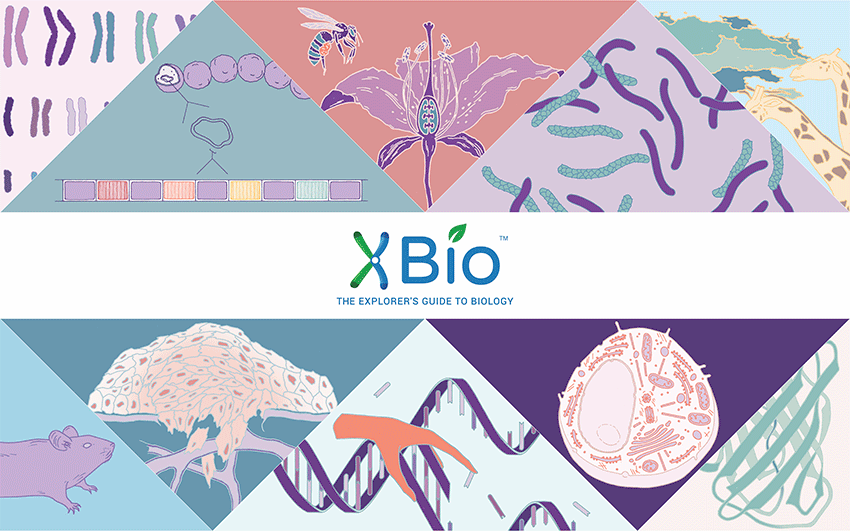
Students complain that college biology textbooks are too dense, too dry, and too expensive. In response, iBiology, in collaboration with TNQ Technologies, has launched The Explorer’s Guide to Biology (XBio). Written by Nobel Prize winners and other distinguished scientists, XBio focuses on stories of scientific discovery and is free-of-charge.
Through narrative prose, beautiful illustrations, engaging animations and professionally-produced videos, XBio boldly reimagines the content and look of the biology textbook for the 21st century. As readers navigate XBio’s unique content, they are taken on journeys of discovery and gain insight into the process and excitement of science. Recognizing the need for global access to high quality learning materials, The Explorer’s Guide to Biology is free.
The current XBio content, available online and as downloadable PDFs, offers an inspiring introduction to genetics and cell biology. In the next few years, XBio aims to cover all major topics found in an introductory college biology textbook. Educators who register on the XBio site will gain access to special educator resources. XBio will have more exciting developments in the coming year. Stay tuned!
Current Content in XBio on Cell Biology and Genetics:
- Rodolphe Barrangou CRISPR-Cas9: Bacterial Immunity and Genome Editing
- Bonnie Bassler Quorum Sensing: How Bacteria Communicate
- J. Michael Bishop Cancer Genetics
- Martin Chalfie Expression of the Green Fluorescent Protein
- Jennifer Doudna CRISPR-Cas9: A Tool for Genome Editing
- Doug Koshland Mutations: Drivers of Evolution and Disease
- Matt Meselson/Frank Stahl How DNA Replicates
- Pam Ronald Plant Genetics and Food
- Shirley Tilghman The Laws of Inheritance
- Ron Vale DNA Structure
- Ron Vale Motility in a Test Tube
Follow XBio on Social Media
- Twitter: @ExploreBiology
- Instagram: explorersguidetobiology
- Pinterest: XBio
- Facebook: facebook.com/TheExplorersGuideToBiology
- LinkedIn: linkedin.com/company/xbio




Gwynn Pealer says
I have only spent a short time with “How DNA Replicates” but it is clear to me that this is an excellent way for students to learn – you have reached your goal of making a new kind of textbook.
I am 73 and teach adult “seniors” about biology. These are people who did many other things in their lives and are now interested in learning things they missed. But for 40 years I taught science, half of that time AP and IB biology. I would love to have had this kind of resource. From the late 1990’s until my retirement in 2008, I watched textbook companies try to figure out how to use the computer, then the Internet possibilities, to improve their product. It was fits and starts that changed all the time and was doing pretty well by the time I left but you have really made a unique leap improving the “textbook”.
This also interests me because in the 1970’s I wanted to use the history of the development of a science concept as a way of teaching so I applied to a nearby university to study the history of science with the thought that my dissertation would be to compare how students learned using the standard methods vs using historical development. The course was part of the history department at the university and they told me my idea was “too practical” for a dissertation. So thank you for giving life to something I had always wished to see happen.